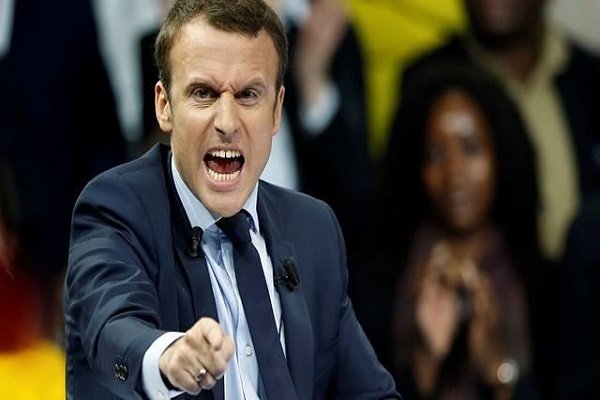Conservative French leaders along with their American counterparts are lining up to make new demands on the Iran nuclear deal. Not to be outdone by the irrational mandates of Donald Trump, French President Emanuel Macron is now calling for amendments to the Iran nuclear deal.
On the sidelines of the United Nations General Assembly, Macron met with Trump in New York to discuss Iran's missile capabilities and set new time limits on the Joint Comprehensive Plan of Action (JCPOA).
In their joint efforts with the US, the French are now demanding restrictions to Iran's missile capabilities. In their latest attempt to demonize Iran, the French have accused the Islamic Republic of violating United Nations Security Council Resolution 2231 and have criticized its use of ballistic missiles.
During the World Economic Summit in Davos, the French also met with Zionist and American leaders. In one of these meetings, Israeli Prime Minister Netanyahu remarked, "I said that in my opinion, the only option at the moment is to introduce real rather than cosmetic amendments that will prevent Iran from nuclearization, which is now guaranteed under the agreement."
The French Foreign Minister Jean-Yves Le Drian is scheduled for a state visit to Iran on March 5, 2018, during which he is to convey the Joint Plan of Paris and Washington and discuss Iran’s regional activities.
Le Drian says he plans to discuss allegations of Iran’s “destabilizing military influence in the Middle East.” The French Foreign Minister alleges that Iran has been supporting Lebanon’s Hezbollah and Yemen’s Houthi militias. This is while France’s sudden criticism of Iran's ballistic missile tests and the threat of new sanctions over the program is an affront to the JCPOA.
Iran has been steadfast in its commitment to the JCPOA, a fact that has been confirmed by IAEA Director General Yukiya Amano. The Islamic Republic’s missile program is purely defensive, and Tehran dismisses malicious allegations set forth by the West that it is destabilizing the region.
The French plan does not appear to be in a violation of the nuclear deal with Iran. Le Drian and Macron are taking a less demanding approach than their right wing counterparts such as former French Prime Minister Laurent Fabius and former President François Hollande, as they do not want to seem controversial in their collaborative efforts with the JCPOA.
The fact is that the French are prepared to oppose the nuclear deal, and they have opted to back the US in their demand for amending the JCPOA. They believe that by imposing pressure or even implementing new missile sanctions on Iran, it is possible to force Iran to negotiate, and then a direct link can be created between Iran's missile power and its nuclear capabilities.
The difference between the French and US approach is the tactics employed by the two parties. During his campaign for presidency in 2016, Donald Trump referred to the JCPOA as "the worst deal ever" and called for "modification" or "withdrawal" from it.
However, the French have chosen the policy of ambiguity regarding the Iran nuclear deal. Terminology used by French leaders in their reference to the JCPOA is wider in scope than that of the Americans. They have claimed to be "commitment to the JCPOA" and "completing the JCPOA."
Therefore, the French are spewing forth rhetoric that is quite different than the type of jargon the world is accustomed to hearing from Americans. In essence, what Donald Trump is saying is: “it’s our way or the highway!”
Many analysts believe that France has not been transparent with their agenda regarding the nuclear accord. This lack of transparency is not due to France’s uneasiness with Iran's nuclear deal, but as a result of their covert collaborative effort with the Americans to discredit the JCPOA through ceaseless false allegations and continued demonization of Iran, a country which has adhered to the terms of the JCPOA with a full commitment.
The French are constantly contradicting themselves. They speak of "the necessity of commitment to the JCPOA" and then say "tie up the nuclear deal to Iran's missile activities".
This paradoxical approach is not something that should be overlooked. French authorities know well that drawing a relationship between Iran's nuclear and missile activities will mean a violation of the JCPOA and withdrawal from the nuclear deal.
In other words, bringing Iran's missile capability under question and throwing the country’s regional activities in the mix only to make additional demands on the JCPOA would be a violation of Iran's fundamental interests, not to mention a violation of the nuclear deal.
However, French authorities are attempting to discredit the JCPOA simply to meet the demands of Donald Trump and his administration.
MNA/TT

























Your Comment